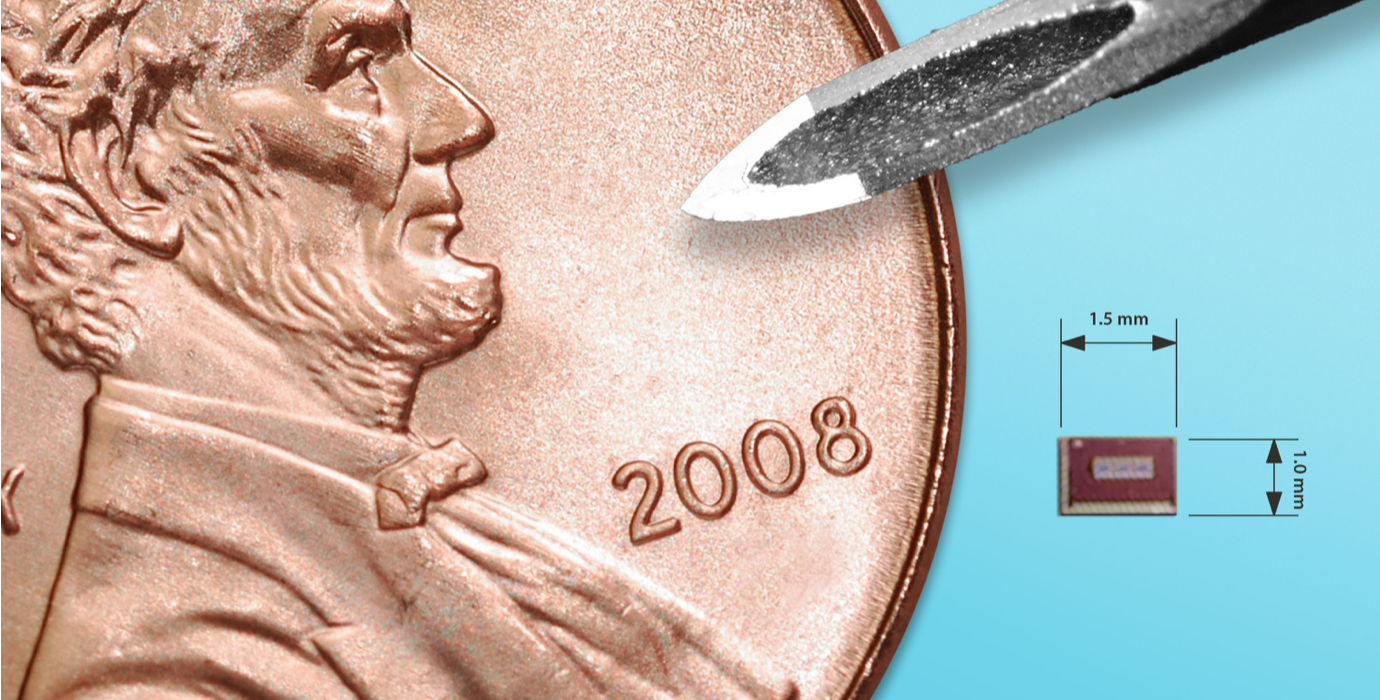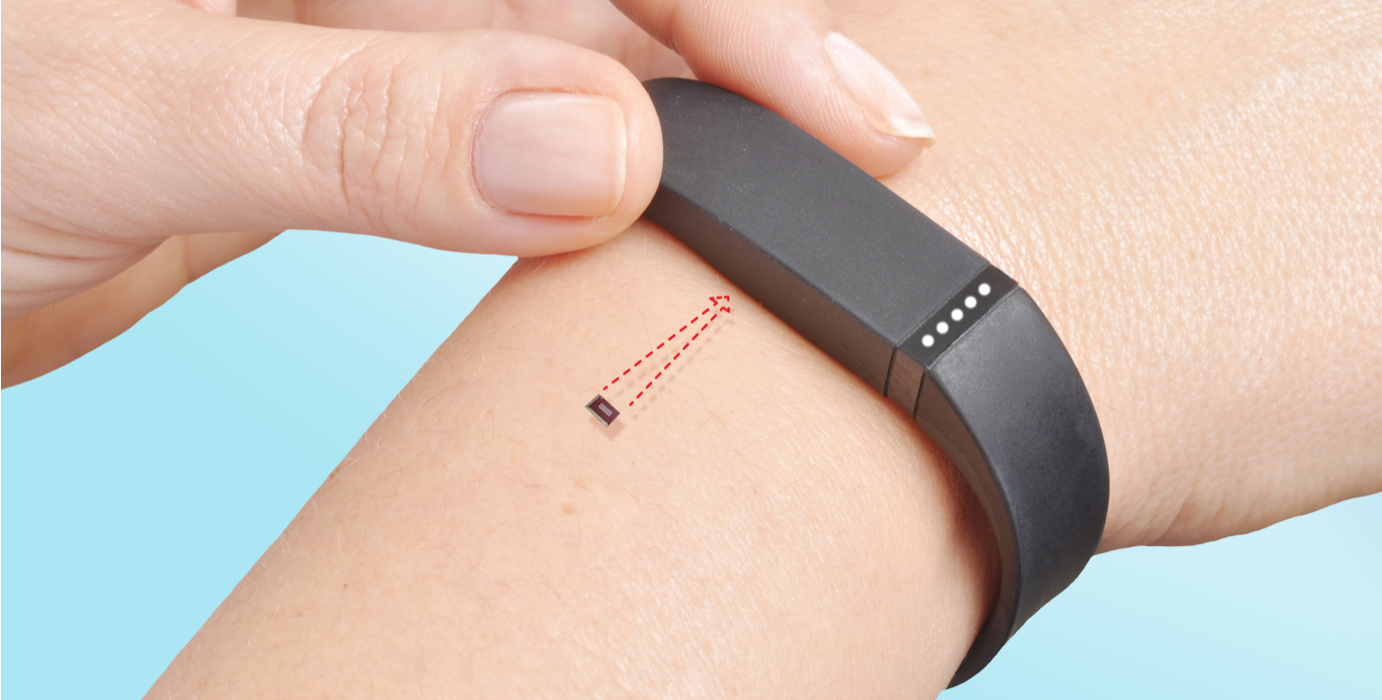
Qualcomm Institute-based Startup Receives Funding to Continue Development of Opioid Sensor
By:
- Katie E. Ismael
Published Date
By:
- Katie E. Ismael
Share This:
Article Content
CARI Therapeutics, a member of UC San Diego’s Qualcomm Institute Innovation Space, has received additional funding from the National Institute of Drug Abuse (NIDA) to refine their tiny implantable biosensor that could help combat the deadly and destructive opioid crisis in the United States.
The second phase of funding from the NIDA’s Small Business Innovation Research and Small Business Technology Transfer programs will allow CARI Therapeutics to continue developing a biosensor called “BioMote” that can continuously monitor opioid use in a patient and send data to health care providers who can intervene quickly if opioids are detected. It can be used along with other treatment options to help reduce relapses and overdoses.

CARI Therapeutics's biosensor (depicted next to a United States penny) is about the size of a grain of rice and is implanted under the skin on the wrist.
“Substance misuse is an immense problem for our society. Beyond the heavy costs from loss of work productivity, health care needs and an increased burden on the judicial system, the human costs from lost lives, broken families and unfulfilled potential is devastating,” said CARI Therapeutics CEO Patrik Schmidle.
“Current treatment strategies are not keeping pace with the growing opioid crisis and new solutions are urgently needed, particularly given the high relapse rates of opioid users,” he said.
Substance use disorders are estimated to cause $400 billion worth of financial damage annually to the U.S. economy, according to the National Institutes of Health (NIH). The number of deaths related to drug overdose has more than quadrupled over the last decade, from 16,000 in 2006 to more than 70,000 in 2017. More than 3 million U.S. citizens and more than 16 million people worldwide are estimated to be suffering from opioid use disorders, according to data from the NIDA, which is a subdivision of the NIH.
Patients who have a previous history of overdose, who have recently been discharged from detoxification programs or who are beginning or ending opioid maintenance therapy tend to be at a high risk of opioid overdose, according to a study published in the NIH's National Library of Medicine. And with the current COVID-19 pandemic causing even more distress and anxiety for those patients, resulting in an increase in drug and alcohol misuse, the risk is even greater.
“Our BioMote has the potential to save insurance companies billions in dollars in claim costs by reducing high relapse rates and ensuring patients in treatment programs use their prescribed medication appropriately. And more importantly, it could also have an enormous social impact by helping to save thousands of lives every year,” Schmidle said.

The wrist-worn wearable device is located above the sensor and transmits opioid measurements.
Dr. Gregory Polston, a pain medicine physician at both UC San Diego Heath and the Veteran's Administration who will advise on the development of the BioMote, agrees.
“By getting real data, from real patients, we will be better able to follow patients, confirm that they are taking their medications and maybe even warn or identify patients if they are in trouble,” he said. “Aggregating this data, we will be able to recommend best practices with these medications. Think of trying to recommend insulin to patients with diabetes without knowing their glucose levels.”
Precision medicine helping to “close the loop”
CARI Therapeutics’s current work builds on the first phase of the BioMote project that successfully demonstrated the viability of a microscale biosensor system that integrates the ability to detect, measure and track the use of opioids to help treat those with opioid use disorders.
The sensor—about the size of a grain of rice— is injected subcutaneously, where it can detect the presence of opioids in interstitial fluid. Measurements are taken throughout the day and the results are communicated wirelessly to a device such as a smartphone or smartwatch. The device can warn users of risky behavior and intervene by alerting healthcare providers if a patient is at risk of dying because of a significant increase in opioid levels in their system.

The information detected by the sensor is then shared with patients, loved ones and health care providers
Drew Hall, an associate professor in the Electrical and Computer Engineering Department at the Jacobs School of Engineering, is one of the principal investigators on the project and developed the injectable sensor technology and the assays used to detect opioids.
“This technology is important because it ‘closes the loop’ in the treatment paradigm by providing quantitative, real-time data rather than relying solely on self-reporting,” he said. “This fits within the broader precision-medicine initiative that is changing how physicians tailor a treatment to individuals rather than using a one-size-fits-all approach.”
The next phase of research funded by this award will focus on:
- Further expanding the functionality of the sensor
- Refining the tools and procedures for inserting and extracting the sensor
- Testing the biosensor in swine and humans
A “game changer” in dealing with increased overdoses
Dr. Carla Marienfeld, a clinical professor of psychiatry and medical director of the Addiction Recovery and Treatment Program at UC San Diego School of Medicine, said medical personnel are seeing signs of increased substance use as well as increased overdoses due to the COVID-19 pandemic.
Marienfeld, who is an advisor on the project, sees first-hand the needs and struggles in people who are trying to recover from substance misuse. “This device will help bring advanced, private, and specific care to the people struggling with substance use disorders that may be worsening during the pandemic,” she said.

Clinicians can remotely keep track of opioid use to inform patient treatment.
Dr. Krishnan Chakravarthy, an assistant clinical professor of anesthesiology and pain medicine at UC San Diego Health, said the current pandemic has highlighted the growing difficulties for addiction patients and the problem of opiate dependence.
“With lack of consistent access to care, these patients find themselves in a tough situation,” he said. “In addition, due to a lack of effective ways to measure addiction and opiate use and issues surrounding diversion, the BioMote technology could be a game changer in how we address these patients.”
This is the fourth federal award, totaling more than $4 million, that CARI Therapeutics has received for its efforts to develop biosensors to monitor and report alcohol and opioid use. (A previous project led to the creation of a technology platform for alcohol monitoring.) Schmidle credits the resources of the Qualcomm Institute and the partnerships with UC San Diego engineering, psychiatry and pain management experts in helping to prepare the grant proposals and ultimately earn the funding.
Other UC San Diego collaborators on the “BioMote” project include the Institute of the Global Entrepreneur (IGE), which has been supporting the development of the commercialization strategy.
Share This:
You May Also Like
Stay in the Know
Keep up with all the latest from UC San Diego. Subscribe to the newsletter today.


